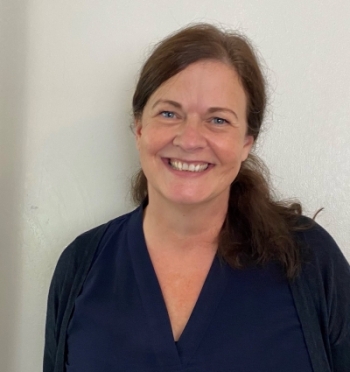Melissa Rochon is lead for surgical site infections surveillance, research and innovation, a service which records incidents of infection after surgery and reviews or changes practice to avoid further infections.
We spoke with her to find out more about her role and motivations.
 Tell us a bit about yourself and your role.
Tell us a bit about yourself and your role.
My first role was about 15 years ago as a staff nurse on the surgical wards at Harefield Hospital I was then offered the chance to take up a secondment role working in surgical site surveillance, with the infection prevention and control team. I loved it is so much I ended up transferring over to that full time allowing me to develop in that area.
My current role is Trust lead for SSI surveillance in research and innovation. I started the role in November 2022 after a restructuring due to the merger of Royal Brompton and Harefield hospitals joined Guy’s and St Thomas’ NHS Foundation Trust.
It’s been very exciting so far as we now have a new surveillance and innovation unit within the Directorate of Infection. This supports work beyond just data collection for wound management and will instead enable more innovation and work within the research field.
Surgical surveillance isn’t really an area many people are familiar with, and many think it falls within the audit remit. Essentially, we work to ensure patient safety which is very rewarding.
What inspired you to work in research?
I think I’m very similar to many of my colleagues in that my first exposure to research was during my nursing training programme. Research was not a module any one really looked forward to! But by the end of the research module, I found that I was really enjoying it.
However, at the beginning of my work in surveillance I had to set aside any research interest to focus more on quality improvement. This allowed me to become familiar with different ways of measuring patient outcomes.
It wasn’t until I started doing my master’s degree in Implementation Science that I revisited all things research. It was quite exciting because I kept thinking “Ah yes, there is a gap in knowledge here, wouldn’t it be interesting to find out more?”.
Fortunately, I was given the opportunity to get involved in the target wound infection study which was set up through the Society of Cardiothoracic Surgery and the Cardiothoracic Interdisciplinary Research Network (CIRN). We were successful in obtaining funding from the National Institute for Health Research. Since then, we’ve successfully completed an observational study at Royal Brompton and Harefield hospitals and completed a national survey looking at barriers and opportunities for wound infection prevention.
Are there any women who inspire you?
I’ve recently come across a colleague, Dr Nadine Hachach-Haram, consultant plastic surgeon at our Trust, who is absolutely fantastic.
She’s a consultant, an entrepreneur and has a busy family life. She’s so dynamic and she’s heading up the new Centre for Innovation, Transformation and Improvement, bringing together other innovators and harnessing that group power to drive improvement.
And before now I’ve never really had the experience where you meet someone and think “Wow, this person is so inspiring!” until I had the privilege of meeting her in person. She’s absolutely fabulous and always very keen to introduce you to other people who can help you out and bring forward the best opportunities for the people around her. I think that’s just incredible.
She’s the perfect example of someone being successful in their own right but also going that extra mile to bring opportunities to others.
What is the most important piece of advice you've been given, either professionally or personally?
Earlier in my career I had a manager whose maxim was to encourage an 80:20 method of working. She encouraged us to spend 80% of our time on what was needed to do our work and 20% of our time working on something that really excites and interest you.
So, we were given the opportunity to go off and do something that we were really interested in and that led to some really interesting and novel projects from our team.
I still work to that method to this day.
How can we encourage more nurses to pursue research roles?
To encourage more nurses into research I think having the right nurse leadership in place is instrumental.
Which is why it’s really exciting to see the establishment of ACORN (A Centre of Research for Nurses & Midwives) at the Trust which will make research opportunities more accessible to nurses, whether that’s nurses who are beginners or those with more experience.
I think this is a big jump forward because it’s sometimes the case with nursing that with everything else going clinically, research just seems like that extra bit too far. Having senior colleagues in research who you can just ask questions to really makes a difference.
For example, Felicia Cox, nurse consultant pain management, was instrumental in my early professional development. She encouraged me to publish early on, coached and set up opportunities for me to develop professionally , and ensured I was networking. She’s now involved in ACORN and will be there to support any nurses with an interest in research.
